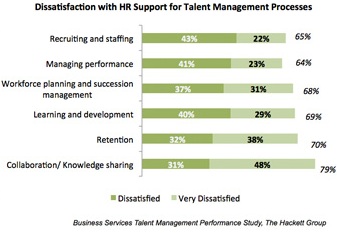Recruiting gets the best of the bad news from business leaders, who say a lack of support from HR is largely to blame for the worsening shortage of talent and skills in their work groups.
Leaders of finance, IT, procurement, and other units of some 145 major global businesses reporting getting such low levels of support from their colleagues in human resources that few of them say they are satisfied with any of the department’s key talent management services.
Even in recruiting and staffing, where the largest number of leaders report receiving at least some level of service, 65 percent of them say they are dissatisfied.
Some 79% of executives dissatisfied with HR
The study by global business consultants The Hackett Group found HR provided a full range of services only in recruiting and only in 13 percent of the 145 companies surveyed; 47 percent more said HR provided at least some recruiting services.
But in the five other areas studied in Hackett’s most recent HR Book of Numbers research, the service levels dropped precipitously. In retention, for instance, only 17 percent of the respondents said HR provided at least some service. Only 1 percent reported getting a full range of service and expertise.
 In no instance, according to the study, did any of the executive express anything close to satisfaction with the help they got from HR. Recruiting and staffing services came out the least bad of the lot, but only by a percent. The worst was in HR’s collaboration and sharing of knowledge where 79 percent of the executives said they were dissatisfied.
In no instance, according to the study, did any of the executive express anything close to satisfaction with the help they got from HR. Recruiting and staffing services came out the least bad of the lot, but only by a percent. The worst was in HR’s collaboration and sharing of knowledge where 79 percent of the executives said they were dissatisfied.
The problems stem from both the changing nature of HR as well as the budget cuts human resources has suffered in the last several years, according to the authors of Cracks in the Foundation: Closing the Critical Skills Gap Undermining Business Capabilities:
One key explanation for HR’s inability to effectively support talent management needs of business services is that HR has had a hard time adapting to its changing mission of enabling business performance. At many companies, HR budget and staff cuts made during the recent recession remain in effect, impacting on talent management programs, along with training, career development, and retention programs.”
Wanted: “a better job of defining and prioritizing … skills”
Contributing to HRs lack of collaboration and sharing is that “few HR organizations have a dedicated business partner role responsible for communicating and understanding the talent management needs of business services functions like finance, IT, and others.”
While recruiting is where HR provides the strongest support to business services, the report notes, “it is also the least effective talent management category employed by business services.” Here, some of the fault rides with the leaders of the business units who “must do a better job of defining and prioritizing the skills and characteristics that are truly essential for job candidates to have.”
The Hackett Group Chief Research Officer Michel Janssen says, “Today’s changing business environment requires that business services organizations retool and radically change their mix of staff to improve their ability to directly impact on business performance. Talent management is key, and business services can’t accomplish this without strong and effective support from HR. Both parties must redouble their efforts to improve their working relationship.”
A laudable goal, and certainly one HR professionals have wrestled with for years. Yet the so-called “seat at the table” is still elusive and beyond the reach of most HR departments.
“Retaining top talent is the key”
Speaking to Talent Management, Harry Osle, The Hackett Group’s global HR practice leader, observed that, “For years, HR professionals have been talking about moving up the maturity curve into the talent management arena.”
“This is where HR tends to struggle because attracting and retaining top talent is the key. HR struggles there because they don’t fundamentally understand how to retain some of these individuals.”
The report offers guidance for both HR and the leaders of the services units to improve both their collaboration as well as the overall delivery of HR business support. Besides insisting that unit leaders better detail the skills and competencies they require, the report authors suggest HR place more of an emphasis on developing staff and on candidate relationship management.
